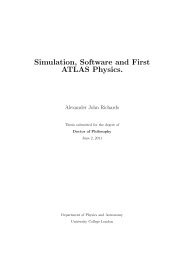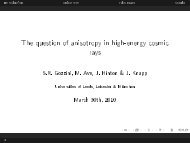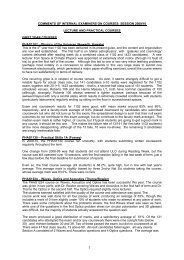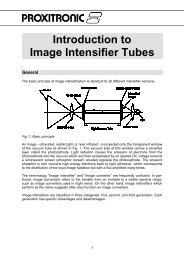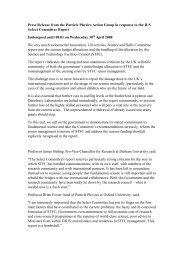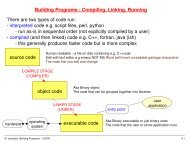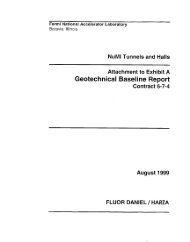- Page 1 and 2:
An Investigation into Transport Pro
- Page 3 and 4:
Contents List of Figures . . . . .
- Page 5 and 6:
Contents 5 4.6 Summary . . . . . .
- Page 7 and 8:
Contents 7 8.2 Test Calibration . .
- Page 9 and 10:
Contents 9 10.3.5 Further Tests . .
- Page 11 and 12:
List of Figures 11 5.7 Effect on cw
- Page 13 and 14:
List of Figures 13 8.16 Unfairness
- Page 15 and 16:
List of Figures 15 8.32 Friendlines
- Page 17 and 18:
List of Figures 17 9.19 Dynamic swi
- Page 19 and 20:
List of Figures 19 D.1 Internet pat
- Page 21 and 22:
List of Tables 21 A.1 Hardware and
- Page 23 and 24:
Publications And Workshops Some of
- Page 25 and 26:
1.2. Research Scope 25 • Identifi
- Page 27 and 28:
1.4. Dissertation Outline 27 • Id
- Page 29 and 30:
Chapter 2 High Energy Particle Phys
- Page 31 and 32:
2.2. Analysis Methods 31 the data i
- Page 33 and 34:
2.3. Data Volumes and Regional Cent
- Page 35 and 36:
2.3. Data Volumes and Regional Cent
- Page 37 and 38:
2.4. Data Transfer Requirements 37
- Page 39 and 40:
2.5. Summary 39 data, the most impo
- Page 41 and 42:
3.1. Data Intercommunication 41 mov
- Page 43 and 44:
3.2. Network Monitoring 43 Whilst l
- Page 45 and 46:
3.2. Network Monitoring 45 Internet
- Page 47 and 48:
3.2. Network Monitoring 47 1 0.8 Bo
- Page 49 and 50:
Chapter 4 Transmission Control Prot
- Page 51 and 52:
4.1. Overview 51 Throughput Delay L
- Page 53 and 54:
4.2. Protocol Description 53 is dep
- Page 55 and 56:
4.2. Protocol Description 55 As a r
- Page 57 and 58:
4.3. Congestion Control 57 excessiv
- Page 59 and 60:
4.3. Congestion Control 59 probe fo
- Page 61 and 62:
4.4. Retransmission Timeout 61 tion
- Page 63 and 64:
4.5. TCP Variants 63 mechanisms are
- Page 65 and 66:
4.5. TCP Variants 65 connection ini
- Page 67 and 68:
4.5. TCP Variants 67 20 15 cwnd sst
- Page 69 and 70:
4.5. TCP Variants 69 no more acks t
- Page 71 and 72:
4.5. TCP Variants 71 [Hoe96]. In bo
- Page 73 and 74:
4.5. TCP Variants 73 TCP Timestamps
- Page 75 and 76:
4.6. Summary 75 traffic for a parti
- Page 77 and 78:
Chapter 5 TCP For High Performance
- Page 79 and 80:
5.1. TCP Hardware Requirements 79 G
- Page 81 and 82:
5.1. TCP Hardware Requirements 81 1
- Page 83 and 84:
5.1. TCP Hardware Requirements 83 C
- Page 85 and 86:
5.2. TCP Tuning & Performance Impro
- Page 87 and 88:
5.2. TCP Tuning & Performance Impro
- Page 89 and 90:
5.2. TCP Tuning & Performance Impro
- Page 91 and 92:
5.2. TCP Tuning & Performance Impro
- Page 93 and 94:
5.2. TCP Tuning & Performance Impro
- Page 95 and 96:
5.2. TCP Tuning & Performance Impro
- Page 97 and 98:
5.3. Network Aid in Congestion Dete
- Page 99 and 100:
5.3. Network Aid in Congestion Dete
- Page 101 and 102:
5.4. Analysis of AIMD Congestion Co
- Page 103 and 104:
5.4. Analysis of AIMD Congestion Co
- Page 105 and 106:
5.4. Analysis of AIMD Congestion Co
- Page 107 and 108:
5.4. Analysis of AIMD Congestion Co
- Page 109 and 110:
5.5. Summary 109 5.5 Summary Even t
- Page 111 and 112:
6.1. Survey of New-TCP Algorithms 1
- Page 113 and 114:
6.1. Survey of New-TCP Algorithms 1
- Page 115 and 116:
6.1. Survey of New-TCP Algorithms 1
- Page 117 and 118:
6.1. Survey of New-TCP Algorithms 1
- Page 119 and 120:
6.1. Survey of New-TCP Algorithms 1
- Page 121 and 122:
6.1. Survey of New-TCP Algorithms 1
- Page 123 and 124:
6.1. Survey of New-TCP Algorithms 1
- Page 125 and 126:
6.2. Discussion and Deployment Cons
- Page 127 and 128:
6.2. Discussion and Deployment Cons
- Page 129 and 130:
6.2. Discussion and Deployment Cons
- Page 131 and 132: 6.2. Discussion and Deployment Cons
- Page 133 and 134: 6.3. Summary 133 6.3 Summary The re
- Page 135 and 136: Chapter 7 Testing Framework for the
- Page 137 and 138: 7.1. Metrics 137 various New-TCP al
- Page 139 and 140: 7.1. Metrics 139 assuming equilibri
- Page 141 and 142: 7.2. Environment 141 of packets in
- Page 143 and 144: 7.2. Environment 143 T 0 B, T T 1 F
- Page 145 and 146: Chapter 8 Systematic Tests of New-T
- Page 147 and 148: 8.1. Methodology 147 fed into the d
- Page 149 and 150: 8.1. Methodology 149 Various other
- Page 151 and 152: 8.2. Test Calibration 151 Goodput (
- Page 153 and 154: 8.2. Test Calibration 153 cwnd and
- Page 155 and 156: 8.2. Test Calibration 155 100 1 Agg
- Page 157 and 158: 8.2. Test Calibration 157 1000 FAST
- Page 159 and 160: 8.3. Results 159 10 100 Total Throu
- Page 161 and 162: 8.3. Results 161 14 12 HSTCP 1 α H
- Page 163 and 164: 8.3. Results 163 cwnd (packets) 120
- Page 165 and 166: 8.3. Results 165 Fraction Bytes Ret
- Page 167 and 168: 8.3. Results 167 1200 1000 HTCP 1 H
- Page 169 and 170: 8.3. Results 169 This is due to the
- Page 171 and 172: 8.3. Results 171 4000 3500 3000 HTC
- Page 173 and 174: 8.3. Results 173 800 700 600 Standa
- Page 175 and 176: 8.3. Results 175 1 1 Fairness Ratio
- Page 177 and 178: 8.3. Results 177 10 100 Total Throu
- Page 179 and 180: 8.3. Results 179 1000 Standard TCP
- Page 181: 8.3. Results 181 600 500 Standard T
- Page 185 and 186: 8.4. Discussion of Results 185 New-
- Page 187 and 188: 8.4. Discussion of Results 187 Asym
- Page 189 and 190: 8.5. Summary 189 The importance of
- Page 191 and 192: 9.1. Transfer Tests Across Dedicate
- Page 193 and 194: 9.1. Transfer Tests Across Dedicate
- Page 195 and 196: 9.1. Transfer Tests Across Dedicate
- Page 197 and 198: 9.1. Transfer Tests Across Dedicate
- Page 199 and 200: 9.1. Transfer Tests Across Dedicate
- Page 201 and 202: 9.1. Transfer Tests Across Dedicate
- Page 203 and 204: 9.1. Transfer Tests Across Dedicate
- Page 205 and 206: 9.1. Transfer Tests Across Dedicate
- Page 207 and 208: 9.1. Transfer Tests Across Dedicate
- Page 209 and 210: 9.1. Transfer Tests Across Dedicate
- Page 211 and 212: 9.1. Transfer Tests Across Dedicate
- Page 213 and 214: 9.1. Transfer Tests Across Dedicate
- Page 215 and 216: 9.2. Preferential Flow Handling Usi
- Page 217 and 218: 9.2. Preferential Flow Handling Usi
- Page 219 and 220: 9.2. Preferential Flow Handling Usi
- Page 221 and 222: 9.2. Preferential Flow Handling Usi
- Page 223 and 224: 9.2. Preferential Flow Handling Usi
- Page 225 and 226: 9.2. Preferential Flow Handling Usi
- Page 227 and 228: 9.2. Preferential Flow Handling Usi
- Page 229 and 230: 9.3. Internet Transfers 229 can cau
- Page 231 and 232: 9.3. Internet Transfers 231 Stanfor
- Page 233 and 234:
9.3. Internet Transfers 233 10 1 St
- Page 235 and 236:
9.3. Internet Transfers 235 1000 90
- Page 237 and 238:
9.3. Internet Transfers 237 Fractio
- Page 239 and 240:
9.3. Internet Transfers 239 10000 c
- Page 241 and 242:
9.3. Internet Transfers 241 achieve
- Page 243 and 244:
9.4. Summary 243 performance of sin
- Page 245 and 246:
9.4. Summary 245 Nevertheless, a Di
- Page 247 and 248:
10.1. Summary 247 PCs. But at 1Gb/s
- Page 249 and 250:
10.2. New-TCP Suitability Study 249
- Page 251 and 252:
10.2. New-TCP Suitability Study 251
- Page 253 and 254:
10.3. Future Directions 253 low ove
- Page 255 and 256:
10.3. Future Directions 255 porates
- Page 257 and 258:
10.3. Future Directions 257 A more
- Page 259 and 260:
10.4. Conclusion 259 This dissertat
- Page 261 and 262:
A.1. Data Storage 261 with the choi
- Page 263 and 264:
A.1. Data Storage 263 gether with h
- Page 265 and 266:
A.1. Data Storage 265 The virtual m
- Page 267 and 268:
A.1. Data Storage 267 Read Speed (M
- Page 269 and 270:
A.1. Data Storage 269 Read Speed (M
- Page 271 and 272:
A.1. Data Storage 271 1600 1600 140
- Page 273 and 274:
A.2. Network Interface Cards 273 la
- Page 275 and 276:
A.2. Network Interface Cards 275 de
- Page 277 and 278:
A.2. Network Interface Cards 277 of
- Page 279 and 280:
A.2. Network Interface Cards 279 PC
- Page 281 and 282:
A.2. Network Interface Cards 281 70
- Page 283 and 284:
A.2. Network Interface Cards 283 Th
- Page 285 and 286:
A.2. Network Interface Cards 285 20
- Page 287 and 288:
A.2. Network Interface Cards 287 ha
- Page 289 and 290:
B.2. Wide Area Network Tests 289 Da
- Page 291 and 292:
C.3. DataTAG 291 Cisco 7606 Cisco 7
- Page 293 and 294:
Appendix D Network Paths of Interne
- Page 295 and 296:
295 ham02gva.datatag.org:192.91.239
- Page 297 and 298:
Bibliography 297 [All03] [AMA + 99]
- Page 299 and 300:
Bibliography 299 [BPSK96] H. Balakr
- Page 301 and 302:
Bibliography 301 [DC02] [ea02] [FF9
- Page 303 and 304:
Bibliography 303 [Flo03] [Flo04] S.
- Page 305 and 306:
Bibliography 305 [Hoe96] [IET] [Jac
- Page 307 and 308:
Bibliography 307 [KRB05] [Lah00] [L
- Page 309 and 310:
Bibliography 309 [MHR03] [MM96] M.
- Page 311 and 312:
Bibliography 311 [Pos81a] J. Postel
- Page 313 and 314:
Bibliography 313 [tePM] IEPM Intern




